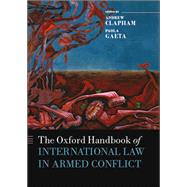
Note: Supplemental materials are not guaranteed with Rental or Used book purchases.
Purchase Benefits
What is included with this book?
| Preface | |
| Introduction | |
| The Law of War: An Historical Perspective | |
| Current Challenges to International Humanitarian Law | |
| The Role of the International Committee of the Red Cross | |
| Sources | |
| Customary Humanitarian Law Today: From the Academy to the Court Room | |
| Treaties in Armed Conflict | |
| Legal Regimes | |
| Land Warfare | |
| Air Warfare | |
| Maritime Warfare | |
| Law of Occupation | |
| The Law Applicable to Peace Operations | |
| The Law of Neutrality | |
| Key Concepts for Humanitarian Law | |
| Prohibited Weapons and the Issue of Superfluous Injury and Unnecessary Suffering | |
| The Principle of Distinction between Civilians and Combatants | |
| Proportionality | |
| Genocide and other Crimes Against Humanity in Armed Conflict | |
| Grave Breaches of the Geneva Conventions and other War Crimes | |
| Internal (non-international) Armed Conflicts | |
| Key Rights in Times of Armed Conflict | |
| The Right to Life | |
| Torture and Other Cruel, Inhuman or Degrading Treatment or Punishment | |
| Fair Trial | |
| Economy Social and Cultural Rights | |
| Protection of the Environment | |
| Protection of Cultural Property | |
| Human Rights of Members of the Armed Forces | |
| Key Issues in Times of Armed Conflict | |
| Aggression, Self-Defence and the Legitimate Use for Force | |
| Terrorism | |
| Unlawful Combatants | |
| The Applicability of Human Rights Law in Times of Armed Conflict | |
| Refugee Law and the Rights of the Displaced in Times of Armed Conflict | |
| Gender and Armed Conflict | |
| Private Military and Security Companies | |
| Answering for violations of the Law | |
| The Accountability of Armed Groups | |
| State responsibility and the Individual Right to Compensation before National Courts | |
| Transitional Justice | |
| Conclusion | |
| Table of Contents provided by Publisher. All Rights Reserved. |
The New copy of this book will include any supplemental materials advertised. Please check the title of the book to determine if it should include any access cards, study guides, lab manuals, CDs, etc.
The Used, Rental and eBook copies of this book are not guaranteed to include any supplemental materials. Typically, only the book itself is included. This is true even if the title states it includes any access cards, study guides, lab manuals, CDs, etc.